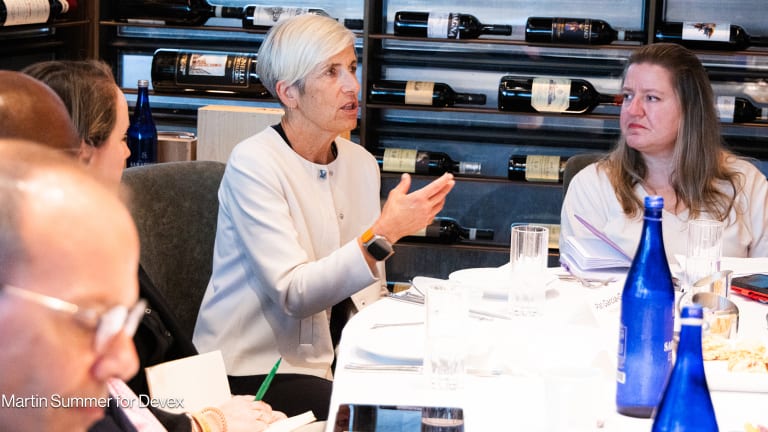
On several recent visits to Africa and Asia, I was struck by the number and diversity of organizations from all economic sectors working together in development. It was very encouraging to see so many donor organizations collaborating more and more, and on so many levels: from program design to implementation and impact monitoring. Besides the bigger players, there were community groups and implementers communicating their basic realities to the more established actors. It was the exciting interface we know so well, where intention becomes purpose, and purpose becomes impact.
But amid all the energy and commitment, something unsettling was happening, as related to me by several individuals, with varying affiliations, in more than one country.
Gaps were emerging in staffing, communication, follow-through and ownership. In some cases, the gaps were inevitable byproducts of complex projects with many actors. In other cases, the gaps resulted from breakdowns in communication between siloed units within and between organizations. People were confident that ad hoc solutions could be found. But the ultimate result was the same everywhere: a sense that increased effort and resources were not producing their full potential impact.
For me, this is a serious challenge to development.
Development community now generally accepts that actors from different economic sectors need to work together to achieve development goals. But many organizations have not followed up this mental shift with changes to their internal structures. In many cases, donor organizations are still based on silos. Some of these are region- and task-specific. Others are tasked with assigning staff, designing and executing tasks, benchmarking, reporting, and planning. The result is a lack of internal discussion and learning that can negatively affect implementation and cause the ultimate impact of a project to fall short of its potential.
At the other extreme, the willingness of some donor organizations and implementing partners to assume nontraditional roles, form unplanned local partnerships and embrace radical flexibility has produced a chaotic feeling within the project. The consequences: Organizational structures are weak, interfaces with partners are messy, and local beneficiaries are not able to discern a structure that will deliver results over time.
Both of these trends undermine key goals of development, including replicability and scalability.
How can we begin to overcome these problems?
I believe we need a new type of partnership manager within government, corporations, foundations and nongovernmental organizations. I call this person the Integrator.
Development today is increasingly about context, connections, linkages and leverage. This is especially true as the needs in developing nations grow more complex and the field of specialized players in development grows and diversifies. We are also demanding more impact from reduced resources, which requires an ability to maximize effort. The Integrators would be empowered to oversee the linkages, to bridge divides in culture and mentality, to ensure that large-scale, long-term project goals are matched by results on the ground, and to leverage those results for both existing and future projects.
These positions are able to gather ideas, people and funding, and fuse them together to advance common goals. Instead of responding to a crisis with known capacities, the Integrators would create nuanced development mechanisms that mirror the complexity of the challenges, and deploy them more or less proactively.
Beyond the job title, I would look for these traits and capabilities:
● Gifted with big-picture leadership and entrepreneurial vision.
● Excellent relationship management skills.
● Able to integrate the key elements of the capture process including win theme, customer relations, competitive assessment, teaming, technical approach, awareness campaign, recruiting, pre-proposal planning, and effective handover and coordination with the proposal and technical team.
● Empowered to oversee project financing, convene stakeholders and negotiate contracts.
● Responsible for benchmarking, reporting on projects of varying duration and complexity.
● Capable of forging consensus and building coalitions.
● Real-life experience not just about development world but the world of business.
The Integrators might sound like the stuff of superhero comic books. But it’s important to realize that these capacities already exist within the development and business community — they are just scattered, duplicated or trapped within silos, and they are not always systematically and efficiently contributing to solutions. The Integrators must be supported by a strong technical and finance team. This team must understand these intricacies and the role of these Integrators and fully support them. Winning must be redefined to celebrate teamwork and it should be rewarded accordingly.
Many in development are always searching for the “next big thing” — the one magical tactic, paradigm or approach that will result in a quantum leap in impact and dramatic progress. This wastes a lot of time and energy, while needs on the ground are mounting daily. As former U.S. President Bill Clinton has said, for most of the problems we are trying to solve, the chances are good that someone already solved it or is thinking about it. We just need the humility to benefit from talents we already possess.
In that same pragmatic spirit, the Integrators are most likely not saviors from outside the system, but individuals on the inside who can leverage vision and experience to eliminate duplication, integrate the contributions of siloed units, bridge gaps in communication and channel effort to maximum impact by listening, watching and synthesizing best practices. While we should continue to innovate, as many organizations are doing, we should also replicate and not be afraid to borrow from the past or present.
For development to reach and truly empower those whom it is meant to benefit, it must be able to organize and augment effort for maximum impact. Integrative partnership management would be a significant — and feasible — step in this direction.
Join the Devex community and access more in-depth analysis, breaking news and business advice — and a host of other services — on international development, humanitarian aid and global health.
Read more career articles on Integrators:
● Move over generalists, make way for integrators
● For would-be ‘integrators’: Is it easier to start in the private sector?
● Careers in food security: Why both specialists and 'integrators' are key








